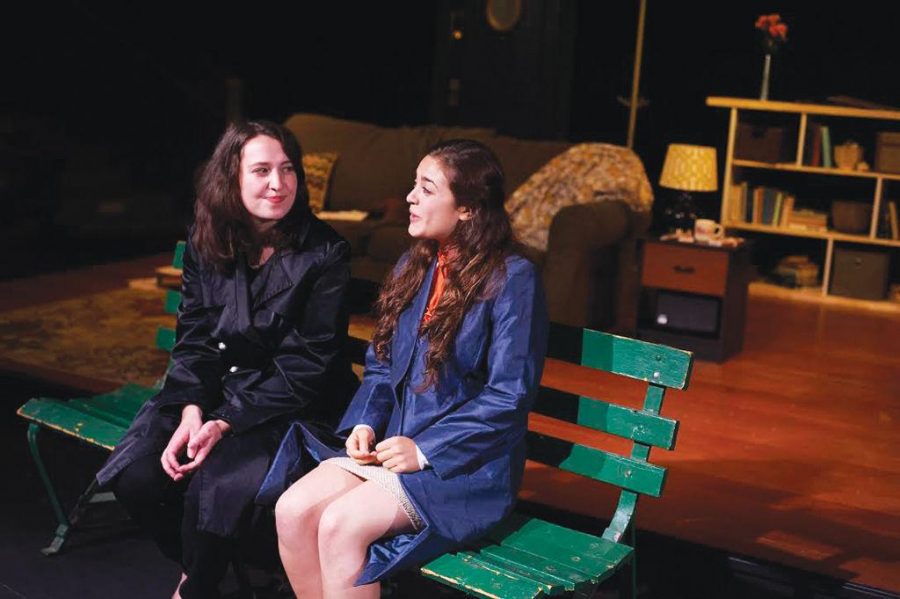‘Stop Kiss’ portrays a ‘stumble into love,’ mirrors the headlines
October 1, 2014
“Stop Kiss,” unfortunately, has turned out to be a timeless play.
The off-Broadway production, which debuted in 1998 at The Public Theater in New York, focuses on two women who unintentionally fall in love, despite their existing relationships with other men. It’s a complicated situation, but it only gets more involved on the night of their first kiss, when they’re brutally assaulted, leaving one of them comatose.
Just last month, when rehearsals for Pitt’s production of “Stop Kiss” were underway, life started to mirror art.
In Philadelphia, a gay couple was walking to get pizza just before 11 p.m. They were interrupted by a group of nearly a dozen attackers who allegedly shouted homophobic slurs before beating them. One of the men came away with an orbital fracture and a laceration from his nose to his lip.
Brittany Coyne, the play’s director and a senior theatre arts major, wishes that there could be an alternate universe that presented “Stop Kiss” as a historical play, documenting events that no longer happened, instead of one that parallels current headlines.
“I wish that we would be able to do this play as a period piece,” Coyne said.
The play, which runs Oct. 2-12 at the Henry Heymann Theatre in the Stephen Foster Memorial, will be the first Mainstage production directed by an undergraduate. Six undergraduate performers comprise the small cast of “Stop Kiss.”
This degree of undergraduate participation in a Mainstage production is highly uncommon, since graduate students or faculty usually have more active roles in direction and oversight. Pitt’s Student Lab performances are where undergraduates usually gain experience behind the scenes, but on a slimmer budget. Coyne directed a Student Lab last year called “Matt & Ben,” and she has another Lab, “Urinetown,” planned for February.
Sara (Leenie Baker), who falls into a coma after the couple is beaten on the street, and Callie (Lucy Clabby, who has written for The Pitt News) form the central relationship. Their former love interests, Peter (Ben McClymont) and George (Kieran Peleaux), are mostly supportive of the new romance, but Peter still holds out hope for winning Sara back during her recovery period. Despite the major roadblock, Callie and Sara remain committed to each other. Bri Wagner and Chris Bennett also star as Mrs. Winsley/Nurse and Detective Cole, respectively.
In many ways, “Stop Kiss” is two stories in one — scenes slalom back and forth between the present-day effects of the assault and Callie’s memories from before her first kiss with Sara, but they maintain their chronology within each storyline. Despite its tremendous ripple effect, the assault isn’t shown onstage.
Jessica Hecht and Sandra Oh starred as Callie and Sara during the original run of “Stop Kiss” five years before the actresses appeared in Alexander Payne’s “Sideways.” “Stop Kiss” was extended only three times in New York, but it has since taken on new life with small theater troupes and college groups all over the country.
Bennett thinks the play has more resonance now than when it first hit the stage.
“I think there’s definitely still a view on gays that [they’re] obviously not widely accepted,” Bennett said. “And, personally, this play [resonates] with me a lot — just the fear of it all.”
For Pitt’s production of “Stop Kiss,” Coyne made some minor updates to the script — such as replacing answering machines with cell phones and changing the names of closed restaurants — to modernize it and remind the audience that “this is something that could have happened while we were watching this play.”
Nearly everyone involved with the play emphasizes that its social implications aren’t necessarily the centerpiece of the story. At its core, “Stop Kiss” is very much an unconventional and organic love story, albeit one that’s interrupted by a particularly horrific event.
“If the phrase is ‘falling in love,’ they really kind of stumble into it. They kind of ‘trip in love,’” Baker said. “It isn’t intended at all. It’s not a romantic love story in the stereotypical sense.”
Coyne also acknowledged how difficult it is to define the progression of the relationship, since they’re a bit reluctant to fall in love. She was also critical of an instinctual desire to put a label on Callie and Sara’s situation.
“There’s just no hint that [they’re falling in love],” Coyne said. “They’re just two people who like to spend time together. It doesn’t have to be anything.”
Despite its brisk running time of 95 minutes, “Stop Kiss” covers a lot of spatial ground — despite the smaller Henry Heymann Theatre.
“Every single scene happens in a different place. Scene one’s in an apartment, scene two’s in an interrogation room, scene three’s back to the apartment — so every scene switches places, which is very hard,” Coyne said. “We had to create an entire hospital in 10 square feet.”
The play’s intimacy has forced the cast to adjust to sharing a limited physical space, but they’ve also grown closer off the stage, finding common ground on the play’s central themes.
“Because of all the issues that surround the work we’re doing, we all feel like we’re on the same page, and that kind of brings us together,” Peleaux said.



